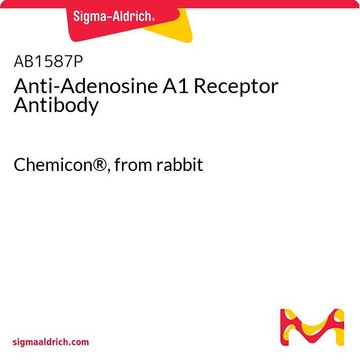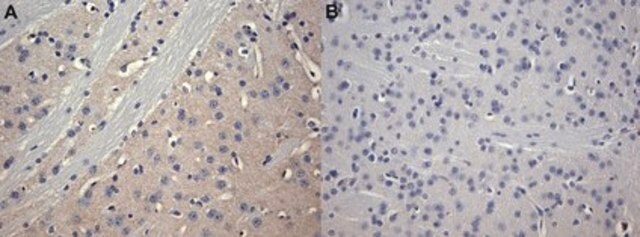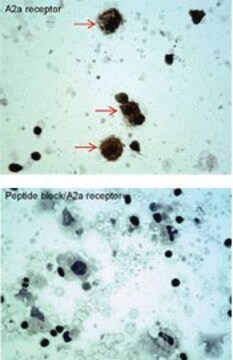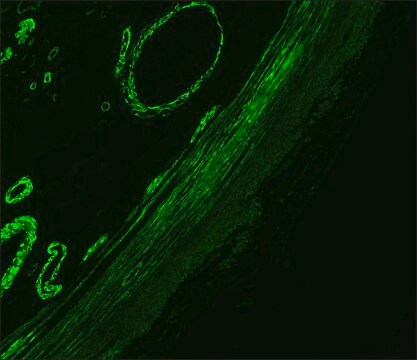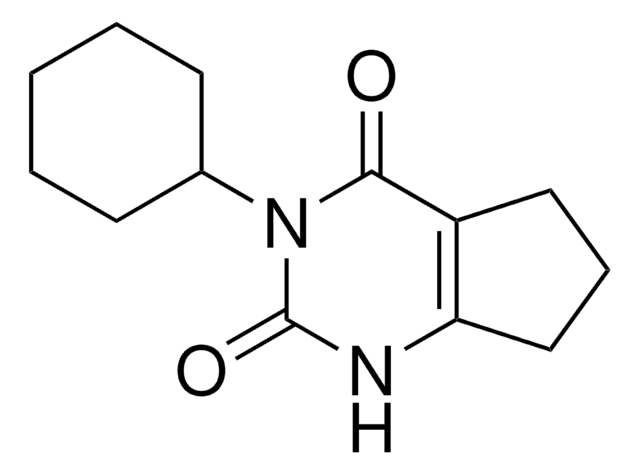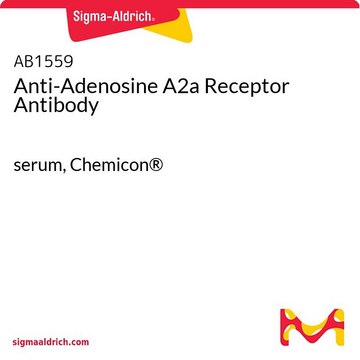推荐产品
生物源
rabbit
品質等級
共軛
unconjugated
抗體表格
affinity isolated antibody
抗體產品種類
primary antibodies
無性繁殖
polyclonal
形狀
buffered aqueous solution
分子量
antigen 36-40 kDa
物種活性
human, rat, bovine (weak)
技術
immunohistochemistry (frozen sections): 1:100
immunoprecipitation (IP): suitable
western blot: 1:1,000
UniProt登錄號
運輸包裝
dry ice
儲存溫度
−20°C
目標翻譯後修改
unmodified
基因資訊
human ... ADORA1(134)
rat ... Adora1(29290)
一般說明
ADORA1 is an adenosine receptor which is part of the G-protein coupled receptor family of proteins. ADORA1 functions as a receptor for adenosine to regulate vasodilation and vasoconstriction in cardiac tissue and kidneys.
Adenosine receptors (ARs) are members of the 7-transmembrane domain G protein-coupled receptor superfamily. Structural, biochemical and pharmacological analyses of the AR genes and protein has led to the discovery of four distinct AR subtypes (A1, A2a, A2b, A3). Activation of Ars ubiquitously mediates cell signalling pathways that protect tissues and organs from damage . Additionally, Ars modulate immune functions of the brain and alters the neurotransmission by glutamatergic and dopaminergic systems
The A1AR is a glycoprotein of MW 36-40 kDa that can activate Gi and Go proteins in vitro In intact cells, agonist occupation of the A1AR has been shown to cause pertussis toxin-sensitive inhibition of adenylyl cyclase activity and, in some systems, a stimulation of phospholipase C resulting in mobilization of intracellular calcium stores. Activation of K+ channels by A1AR has been intensively studied in relation to its dramatic effects on the cardiovascular system
A1AR protein is highly expressed in brain (especially cerebellum, hippocampus, thalamus, and cortex) and spinal cord and in part, modulates neurotransmitter release In white adipocytes, A1AR inhibits lipolysis and stimulates glucose uptake. Other tissues also express A1AR including kidney and testis
The A1AR is a glycoprotein of MW 36-40 kDa that can activate Gi and Go proteins in vitro In intact cells, agonist occupation of the A1AR has been shown to cause pertussis toxin-sensitive inhibition of adenylyl cyclase activity and, in some systems, a stimulation of phospholipase C resulting in mobilization of intracellular calcium stores. Activation of K+ channels by A1AR has been intensively studied in relation to its dramatic effects on the cardiovascular system
A1AR protein is highly expressed in brain (especially cerebellum, hippocampus, thalamus, and cortex) and spinal cord and in part, modulates neurotransmitter release In white adipocytes, A1AR inhibits lipolysis and stimulates glucose uptake. Other tissues also express A1AR including kidney and testis
Anti-A1 Adenosine Receptor is specific for A1 adenosine receptor adenosine receptor subunit. By immunoblotting, it reacts strongly with human and rat, and weakly with bovine A1. The antibody detects A1 adenosine receptor in human hippocampus by immunohistology and may be used for immunoprecipitation and confocal microscopy
免疫原
synthetic peptide (Gln-Pro-Lys-Pro-Pro-Ile-Asp-Glu-Asp-Leu-Pro-Glu-Glu-Lys-Ala-Lys-Ala-Glu-Asp) derived from amino acids 309-326 of the rat A1 adenosine receptor C-terminal domain.
應用
Rabbit anti-A1 adenosine receptor antibody can be used for immunohistochemistry and immunoblotting assays using rat tissues. The antibody can also be used for immunocytochemistry assays using rat spinal cord tissues. The product may also be used for immunoprecipitation applications.
外觀
Solution in phosphate buffered saline containing 1 mg/mL BSA and 0.05% sodium azide.
免責聲明
Unless otherwise stated in our catalog or other company documentation accompanying the product(s), our products are intended for research use only and are not to be used for any other purpose, which includes but is not limited to, unauthorized commercial uses, in vitro diagnostic uses, ex vivo or in vivo therapeutic uses or any type of consumption or application to humans or animals.
未找到合适的产品?
试试我们的产品选型工具.
儲存類別代碼
10 - Combustible liquids
水污染物質分類(WGK)
WGK 1
閃點(°F)
Not applicable
閃點(°C)
Not applicable
個人防護裝備
Eyeshields, Gloves, multi-purpose combination respirator cartridge (US)
Christopher S Rex et al.
The Journal of neuroscience : the official journal of the Society for Neuroscience, 25(25), 5956-5966 (2005-06-25)
Memory loss in humans begins early in adult life and progresses thereafter. It is not known whether these losses reflect the failure of cellular processes that encode memory or disturbances in events that retrieve it. Here, we report that impairments
S A Rivkees et al.
Brain research, 677(2), 193-203 (1995-04-24)
Polyclonal antisera were generated against two identical regions of rat and human A1 adenosine receptors using synthetic multiple-antigenic-peptides as immunogens. Western blotting showed that the antisera recognized a single protein in brain of the expected size for A1 receptors. Immunohistochemistry
Stefania Gessi et al.
Advances in pharmacology (San Diego, Calif.), 61, 41-75 (2011-05-19)
The adenosine receptors A(1), A(2A), A(2B), and A(3) are important and ubiquitous mediators of cellular signaling, which play vital roles in protecting tissues and organs from damage. In particular, adenosine triggers tissue protection and repair by different receptor-mediated mechanisms, including
Role of adenosine A1 and A3 receptors in regulation of cardiomyocyte homeostasis after mitochondrial respiratory chain injury
Schneyvays V et al
American Journal of Physiology. Heart and Circulatory Physiology, 288, H2792-H2792 (2004)
M Schindler et al.
Neuroscience letters, 297(3), 211-215 (2001-01-04)
Adenosine exerts its physiological actions by binding to G-protein coupled receptors, four of which have been identified and cloned to date (A1, A2a, A2b and A3). Here we report the development of anti-human adenosine A1, receptor anti-peptide polyclonal antibodies and
我们的科学家团队拥有各种研究领域经验,包括生命科学、材料科学、化学合成、色谱、分析及许多其他领域.
联系技术服务部门